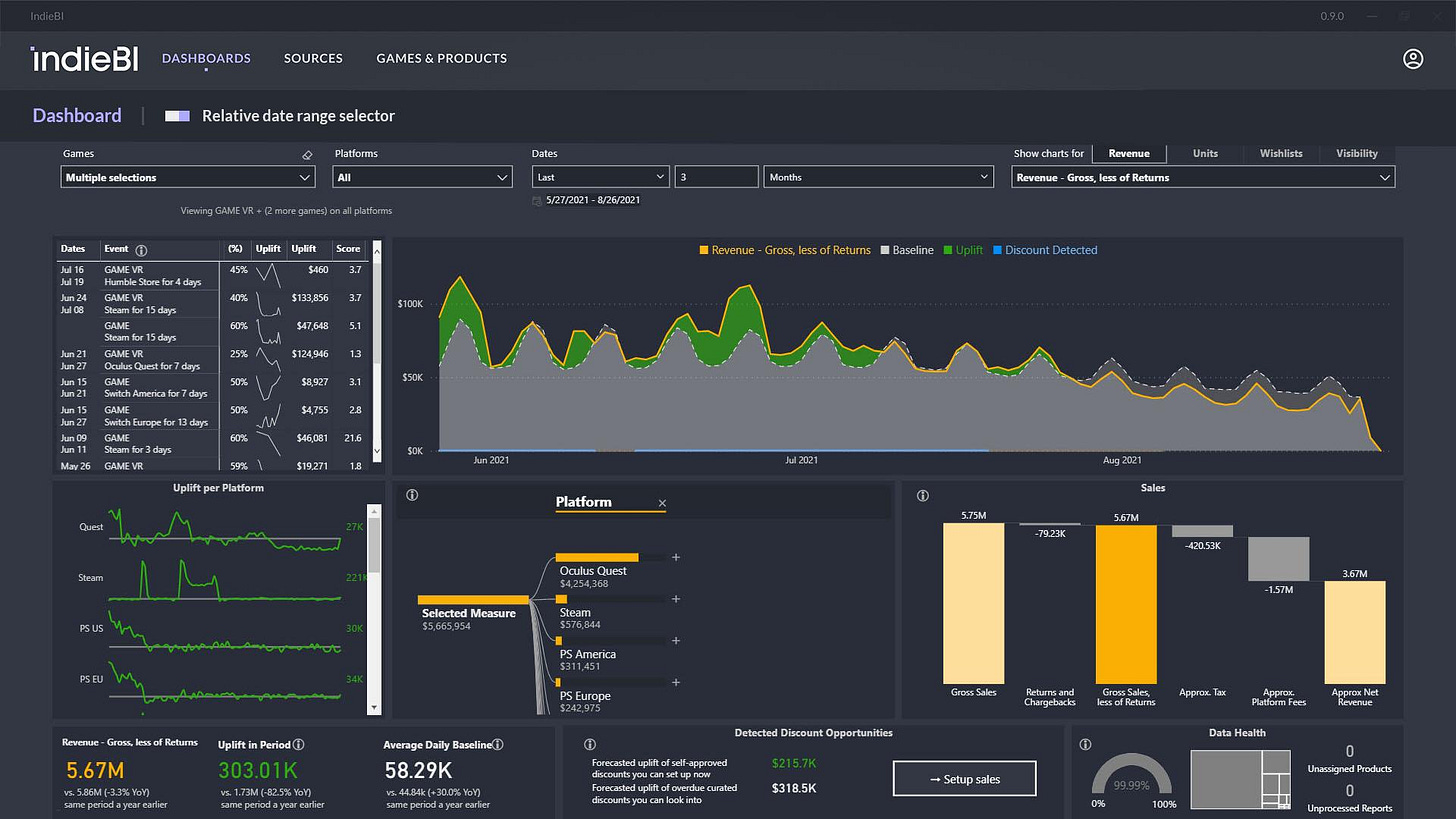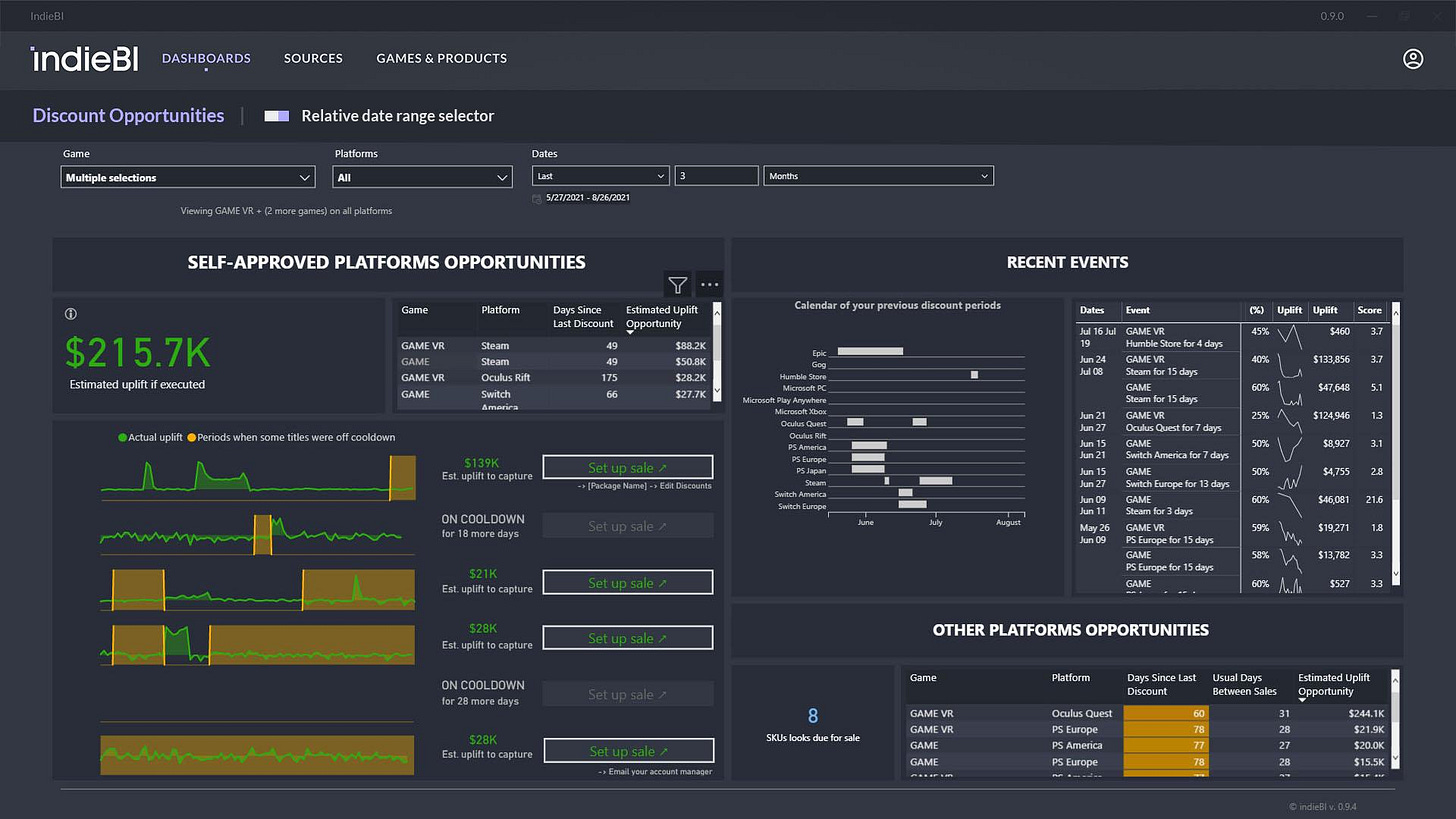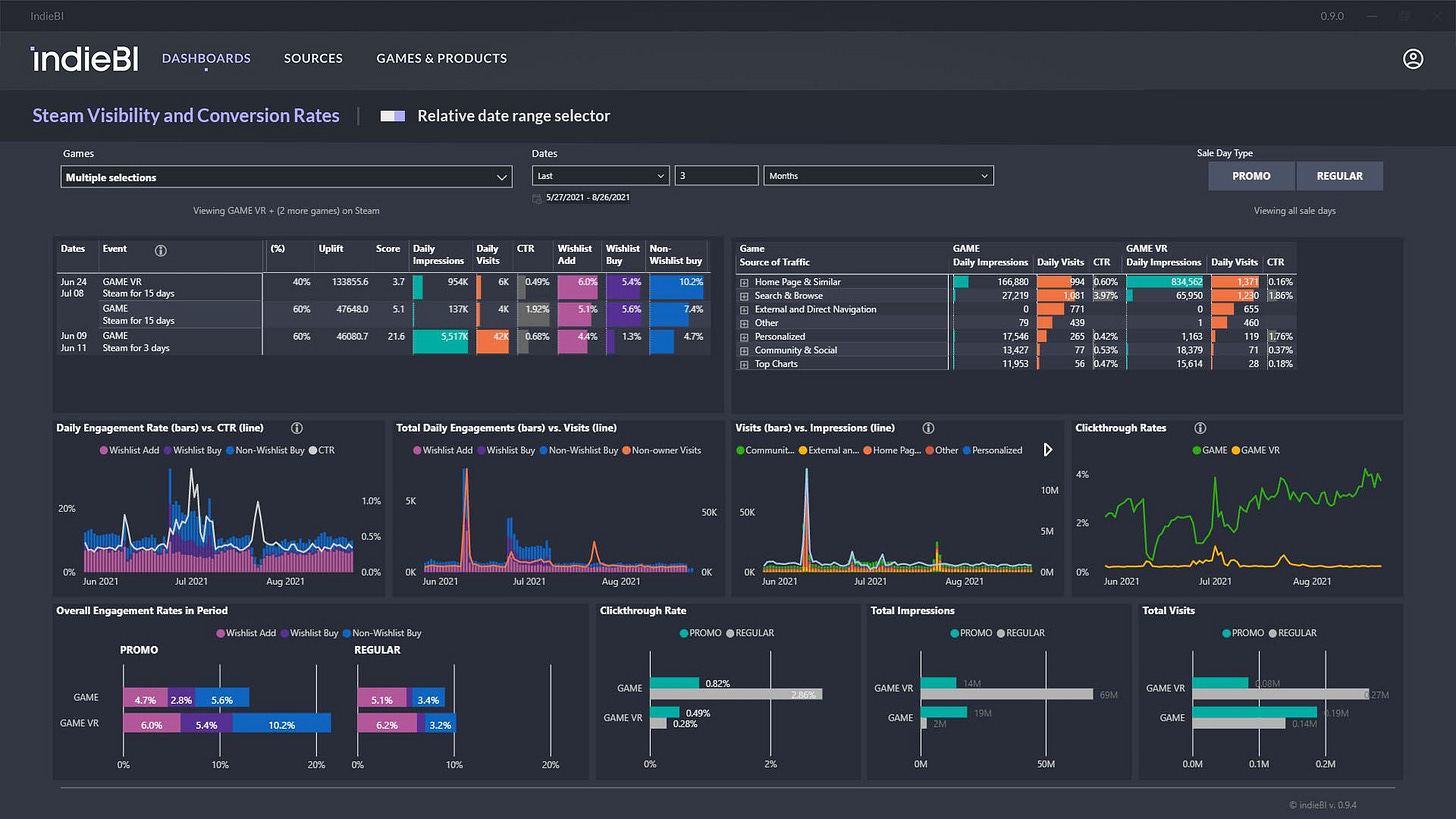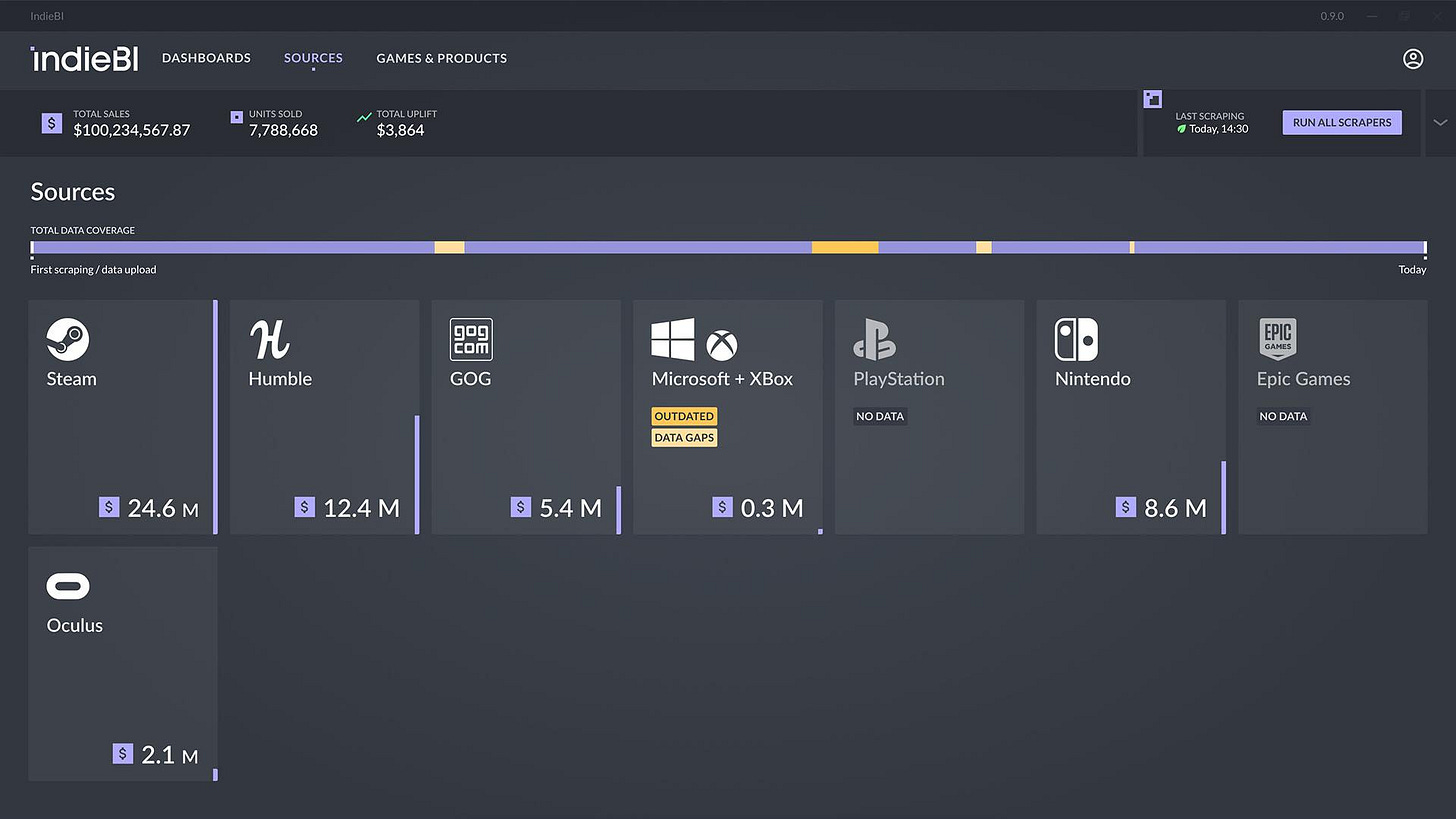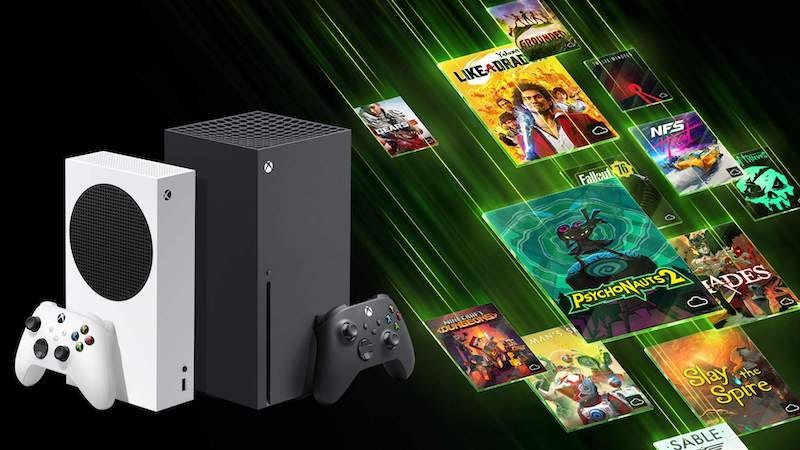Why business intelligence - and IndieBI - matters
Publikováno: 17.11.2021
You can't strategize if you can't see.
[The GameDiscoverCo game discovery newsletter is written by ‘how people find your game’ expert & GameDiscoverCo founder Simon Carless, and is a regular look at how people discover and buy video games in the 2020s.]
The birds are singing, the sun is shining* (*offer only currently valid for a portion of the world map), and it’s certainly a Wednesday here. So we’re going to get going, and bring you our customary dose of news, views (and even interviews!) from the world of game discovery.
Incidentally, it’s Thanksgiving week in the U.S. next week. We are going to be afk earlier in the week, so expect no conventional newsletter next Monday (maybe a small promotional missive!), but newsletters on Wednesday (free) and Friday (paid). And if you’re off, have a great holiday!
[REMINDER: if you appreciate our work, grab a GameDiscoverCo Plus paid subscription - you can come and chat & exchange tips with us on the Plus-exclusive Discord, get a bunch of useful PC/console charts & analysis via an exclusive newsletter every Friday, & lots more.]
IndieBI talks funding, utility for PC/console biz intel
So I think we’ve mentioned the PC/console centric business intelligence tool IndieBI a couple of times in recent months - but never too prominently, since the company was still in early development.
Today, IndieBI has come out with the announcement that they’ve raised a game biz-driven angel investment of $3M USD to expand, from folks such as Olga and John Graham (Humble Bundle), Forest Willard (Innersloth), Matias Myllyrinne (Redhill), Brjann Sigurgeirsson (Thunderful Group), & Alexis Garavaryan (Kowloon Nights and Kepler Interactive). Probably the most impressive game-centric angel round I’ve seen?
But if you read this newsletter, you’ll know we’re not generally very concerned with who raised money from whom. It’s more about what practical tools you can have, and how they can make a difference.
And I’m here to say that IndieBI does what has been sorely needed for a long time - systematize business intelligence for ‘premium’ PC and console games. We’ve used it with at least one company we advise, and it provides an extremely helpful holistic view of the biz - we’re evangelizing it now because we dig it, and IndieBI will be expanding access to the platform soon(ish?)
But first, some background. How did IndieBI originate? Tom Kaczmarczyk - who co-founded the company alongside Callum Underwood - explains: “We originally built IndieBI way back in 2018 as a homebrew tool to help us manage our sales at SUPERHOT... With games shipped across a dozen major sales platforms, tracking our sales and making smart decisions was quickly becoming a huge challenge and a source of anxiety.”
“We were starved for anything resembling modern business intelligence and there were exactly zero options available off-the-shelf that’d properly hit the spot for us. Efficient business management is a pretty hard problem — and admittedly not the most glamorous aspect of game development — so there really was nobody in the industry working to solve this. So we went ahead and started solving it ourselves.”
The tool is currently used by companies including Innersloth, Vertigo Games, Raw Fury, and Kowloon Nights, btw. But when we say ‘business intelligence’, what does that mean? Lots of graphs that look nice but nobody ever uses? Well, the most obvious thing IndieBI does that actually might generate revenue for you is to track when you can discount your games (above pic), and the money you’re leaving on the table if not doing it.
We’ve previously commented that “some game makers don’t spend enough time being 100% methodical about discount timings and amounts”, and this is a great tool to remind you. (You’ll note it’s phrased as opportunities for ‘self-approved platforms’ such as Steam and Switch - since you can’t discount at will on PlayStation or Xbox.)
That’s the most obvious practical use of the tool. But IndieBI also gives you a holistic revenue dashboard across all platforms and titles that you develop or publish, with clear ‘discount uplift’ built into the graph (see top picture!) It also allows a lot of breakdown and analysis into regional sales (and pricing optimizations), mix of sales, and sales over time.
And it also tracks Steam wishlist and impression trending (see below screenshot), though I’ve spent the least amount of time with that part of the back end. In any case, I sat down on a video call with IndieBI’s Tom Kaczmarczyk last week and got to ask him some extra questions that I thought some of you might want to know.
Firstly, where is the platform going? Beyond its existing aggregation work, the hope over time is to use anonymous aggregated information to help set the best tactics. Tom told me: “People will naturally want to have a perspective of what actually works in terms of best practices - [questions like] what numbers they should expect their games to actually make, what conversion rates are good, what revenue split between platforms is good, or when to launch your game.” That’s the longer-range intent of IndieBI.
Oh, and on the data security side of things - that’s probably something you’re potentially worried about as a dev/publisher, right? Tom explains: “We appreciate that people are trusting us with fairly sensitive business data. That's also why we opted to spin out IndieBI entirely out of our game studio, so that it’s a separate entity. We don't have any… [special] interest groups involved with IndieBI that would potentially want to misuse or otherwise abuse our privileged access to information. So that's… the philosophy behind it.”
In addition, he says the company’s engineering is built around the understanding there’s important and confidential data in there. And he says IndieBI intends to use “industry best practices” to ensure the info stays in the correct silos, including automated security scans and periodic external audits.
Another question you might have is - are NDA-heavy platforms like Nintendo, Sony, and Microsoft OK with this large-scale aggregation of their data? Tom says, that while there are no people responsible for analytical platform relations at these platform-holders (very true!), “everybody who've we’ve actually talked to on the platform side is very happy that this exists and are supporting it as much as they can, internally.”
In IndieBI’s company view, from a legal/contractual point of view, using it really isn’t that different from a developer downloading their own information from Sony and uploading it to a Google spreadsheet. This just happens to be a larger analytical platform: “We are just repackaging it into a service that is much more approachable, much more democratized, and much more available to everyone from the smallest developers in the industry, all the way up to publicly traded companies.”
One important thing to note: the service is still in limited Beta, though you can request a Beta invite via the IndieBI website. We’ll tell you when it rolls out more widely. But how much will it actually cost when launched? Tom indicates: “We have no conclusions just yet. We specifically wanted to raise this, this additional funding route to give us enough runway to actually figure out what makes the most sense.”
But Tom says the intention is to run IndieBI as a SaaS (software as a service) platform where “we will definitely keep it free or almost free for all of the all the indie developers and smaller companies that haven't yet had a breakaway success hit.” There may be larger monthly or yearly costs for bigger companies, “so that for the largest ones, it would probably still be comparable or less expensive than hiring an on-staff analyst, while giving much more value than that.”
Hopefully, the larger customers can help subsidize the smaller indies, which will, as Tom says, “make the entire industry a bit more of a level playing field.” I can’t predict where their business will end up, but it’s at least starting from a fairly altruistic point.
Finally: I think the biggest issue IndieBI needs to overcome is its split customer base. It’s already the case that post-release discounts - its most blaringly obvious use case - don’t always have a good ‘home’ in many game companies beyond marketing (who is often busy with other things!)
And there’s at least 3 or 4 stakeholders (finance, business, marketing, etc) who could use IndieBI in a larger company, but might not be motivated or organized to do so individually. Perhaps it’ll take higher level decisions over time to make this a priority. (And for small devs - you can just decide to use it all on your own!)
So - we like IndieBI, we hope many can try the existing Beta, and we look forward to its wider rollout sometime next year. At which point we’ll come back and poke at it some more.
Let’s Build A Zoo: tidbits from a good launch?
You may be aware that Springloaded & No More Robots’ chill zoo sim Let’s Build A Zoo - very much inspired by the ‘90s Bullfrog sim games - has had a pretty decent Steam launch so far.
(Disclaimer: I’m an investor/advisor in No More Robots. But as previously discussed, most of my ‘work’ involves hanging out in the Discord and watching the team do great work, while outputting approving noises and/or dumb emoji.)
And there are definitely learnings from NMR CEO Mike Rose’s stat-filled Twitter thread about the launch that were worth pointing out:
Mike reveals, as of Nov. 12th: “In the first 7 days we've sold 32k units, which translates to nearly $500k in [gross] revenue. This roughly matches what my expectations for the game were, and it means that all dev costs have been recouped, and the future for the game (and loads of further updates!) has been secured.” That was about 500 Steam reviews, btw - so just over 60 sales per review.
Particularly interesting is the country breakdown: by unit, the U.S. at 26%, China at 16%, Thailand at 13%, UK and Germany at 6%. Mike says: “The high Thai player numbers wasn't a huge surprise to us, since of our 65k launch wishlists, 12k of them were from Thailand (nearly 20%!)” The game did localize into Thai because of the interest, btw - a good example of wishlists actually converting to sales, albeit at less $ compared to the U.S. and Europe.
Mike mentions: “One thing I'd say we've done exceptionally well with this launch, on both the No More Robots (pub) side and on the Springloaded (dev) side, is provide crazy levels of support to players.” If you twin this with multiple demos and beta versions - so a lot of the rough corners were already knocked off the game before release - that’s one reason why it’s at 89% Positive reviews on Steam.
Oh, and I passed along stats to Mike via our new Plus-exclusive post release tool: “According to data from GameDiscoverCo, we're currently the 5th biggest Steam release of the month so far.” Looks like a couplemore titles have ticked past it since the 12th, but it’s still in the Top 10 right now, and should comfortably be in the Top 20 for the month, by units sold.
Of course, no launch is perfect. Let’s Build A Zoo still has a few ‘quality of life’ UI improvements and various other issues to deal with. But it’s nice to know that if you’re in the right genre with a top quality game, you can still launch long-term successful, profitable titles - despite the pace of game launches being so hectic.
The game discovery news round-up..
Before we get started here, a correction. In talking about Game Pass on Monday, I inadvertently said that it was Gang Beasts that Microsoft was referencing as a Game Pass title that made people buy more games not on Game Pass. It was actually Human Fall Flat, the other ‘knockaround physics multiplayer’ title. Apologies.
(I still wouldn’t call HFF a puzzle game at its core. And of course, people didn’t buy other ‘puzzle games’ outside of Game Pass specifically because of it. But it did at least originally start closer to that genre, before the multiplayer ‘sandbox’ patch which made the game popular shipped onto Xbox in 2018.)
Anyhow, onward to today’s links, which are numerous and wondrous, as follows:
Looks like Xbox has got the cloud angle rolled out: “Today you can play Game Pass games from the cloud on your Xbox console. We’re excited that Xbox Cloud Gaming (Beta) is now available on Xbox One and Xbox Series X|S consoles with a Game Pass Ultimate subscription.” Making this Ultimate-only is a sly upsell, and I’ll be using this very shortly. Insta-try for multi-GB Game Pass titles is a great feature.
The Keighley-verse is expanding again with the announcement of The Game Awards 2021 nominees - here’s an at-a-glance view - and: “Deathloop received the most nominations with nine…. Ratchet & Clank: Rift Apart with six, and It Takes Two and Psychonauts 2 with five. Sony Interactive Entertainment and Xbox Game Studios lead the publishers with 11 nominations each, followed by Bethesda Softworks, Electronic Arts and Square Enix with ten.”
Microlinks: a Bloomberg report on PS5 hardware hortages cites a claimed shift from PlayStation to PC players, citing ‘one top Japanese game publisher’ ; Oculus & Meta getting even more Ready Player One with this haptic glove prototype; Tim Sweeney says that: “What the world really needs now is a single store that works with all platforms.” We’ll, uhh, get right on that.
In a recent investor presentation, “Qualcomm CEO Cristiano Amon said… that “Oculus Quest 2 was 10 million units,” with the comment representing some of the strongest language we’ve heard yet about the market adoption for the headset.” Qualcomm now claims this is a) estimated third-party numbers on b) shipped headsets. But Qualcomm chips help power Quest 2, so they should probably know, right? Either way, there’s good momentum.
We ran coverage in the last newsletter, but I thought Ars Technica’s write-up of the Steam Deck presentations was also helpful, if you didn’t have time to watch them: “Since the APU doesn't have any hard limits for its power draw, Valve said games running on Steam Deck should impose a frames-per-second limit of 60 fps (to match the display) or 30 fps (for games that push the GPU) in order to maintain battery life.”
Microlinks, pt.2: Everyone pitching the metaverse has a different idea of what it is; Japanese digital console rankings for October, with Undertale & Among Us doing great on eShop; did you know Netflix is now super transparent about its top shows worldwide & per country? Do that, game platforms!
Two interesting things in this GI report on Ampere’s new console hardware research showing PS5 at 12.8m units lifetime & Xbox Series consoles at 6.7m: “[Xbox Series] S and X are at least 50/50 in terms of install base in major territories.” So that’s a large percentage of consoles with no disc drive, hence: “Xbox game sales are heavily digital, even compared with PS5. According to GSD data, over 90% of sales of Call of Duty: Vanguard on Xbox came as a digital download.”
We don’t cover non-game discovery stuff much, but a word here from Kris Graft on the mess at Activision Blizzard: “The actions of Kotick and the complicity of the board leave no opportunity for trust in leadership, no way to accountability, safety, and security among employees, and therefore no path forward for this company in its current state.” Seriously, folks.
Microlinks, Pt.3: a useful ‘explainer’ decoding the possible uses for blockchain gaming - the more you know, etc; why beta testing your marketing on multiple platforms is a good idea; cozy virtual event space Skittish is now open for all, and if you want to use it for your micro-game dev meetup, there are limited free sponsorships.
Finally, if you think the PC/console game industry has issues with ‘winner takes all’, Bossfight creative director (and Star Wars: The Old Republic MMO veteran) Damion Schubert has some news for you:

grateful myk @mykola
Please quote this tweet with a thing that everyone in your field knows and nobody in your industry talks about because it would lead to general chaos.As he goes on to note: “People underestimate on mobile how directly spending ad dollars leads to users in the mobile space, and doing that right now is more than an order of magnitude more expensive than it was a decade ago.” It’s a thing - but as long as you all know it’s a thing? See you next week…
[We’re GameDiscoverCo, a new agency based around one simple issue: how do players find, buy and enjoy your premium PC or console game? We run the newsletter you’re reading, and provide consulting services for publishers, funds, and other smart game industry folks.]
